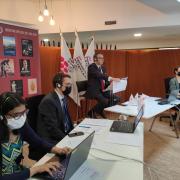Displaying 2680
Events
20/04/2021 - 22/04/2021

News
Speaking from the OIV’s headquarters in Paris, by web conference, Director General Pau Roca presented on 20 April, information on wine production, consumption and international trade in 2020.
OIV State of the vitivinicultural world in 2020 report
Watch the replay
19 Apr 2021
Events
08/04/2021 - 18/04/2021